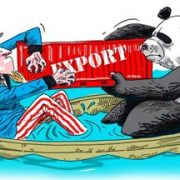The First Shots in the Trade War Have Been Fired and You Got Hit!
There is no doubt about it.
The opening shots of a global trade war have been fired. The bad news is that you got hit.
And we may have to suffer another Great Depression before these errant policies get reversed.
That's what happened last time.
Today we learned that the administration is imposing an emergency 25% tariff on imported steel from ALL countries, friend and foe alike.
This is on the heels of the cancellation of the Trans-Pacific Partnership last year.
The move promises to bring to a screeching halt the import of semi finished goods from Mexico and Canada, essential in the production of US autos. American manufacturing will suffer.
The big victims will be American car buyers, who in the future will have to pay much higher prices for lower quality products.
It also cedes international markets to foreign car manufacturers who will labor under no such restrictions.
This is why the shares of American carmakers have been so badly sold off.
The recent 20% import duty on Canadian lumber achieved much the same. The move will add about $3,000 a year to the cost of new homes.
Notice that there is a commonality in these measures.
They favor a small number of producers at the cost of millions of consumers.
The lumber duty is especially lopsided, benefiting about 1,000 lumbers producers at the expense of 550,000 homebuyers a year.
It is also moving money out of blue liberal states and into red Trump supporting states, where most lumber mills reside.
Expect this trend to continue for three more years.
The costs of these protectionist moves are already being felt.
Mexico, the second largest buyer of American agricultural exports, has started shifting purchases to friendlier Brazil and Argentina.
You can see this across the commodities markets, which are all plumbing new five-year lows. Trump supporting American farmers are about to get totally shafted.
We already know that at the first sign of restrictions against Chinese imports, the Middle Kingdom will simply cancel orders for hundreds of Boeing aircraft and move the business to Airbus Industries in Europe.
I guess we're lucky because it took all of 80 years to forget the hard learned lessons of the last round of "America First" policies during the 1930's. There were many.
Trade wars aren't damaging to the initiators of trade wars. They hurt all countries.
Globalization expands the pie. Protectionism shrinks it. And yes, we will suffer less than our competitors because we have the largest domestic market. But suffer we will nonetheless.
Foreign restrictions on US exports have been blamed for the demise of the US manufacturing base, declining real wages, and falling standards of living.
However, according to the World trade Organization, only 6.5% of global trade is subject to such barriers.
Protectionism is also a highly regressive tax, as the resulting higher prices eat up a larger share of lower earning families.
Protection of an industry signs its death warrant.
I watched this happen to the US auto industry from 1985 to 2009.
President Reagan forced export restrictions on Japanese car manufacturers and engineered the Palace Accord, which resulted in an eventually tripling of the value of the Japanese yen against the US dollar.
What happened?
The Japanese share of the US car market grew steadily from 20% to 45%. It turns out that consumers were happy to pay up for quality and superior technology, which Detroit sorely back.
Detroit could have produced the Prius at any time in the last 50 years. There is no new technology in it. Instead, it was created by Toyota Motors (TM) in Nagoya.
General Motors (GM) eventually went bankrupt, Chrysler got taken over by Fiat, and Ford (F) barely hung on by the skin of its teeth.
Even today, some 50 years into this competition, US car mileages lag Japanese ones by the huge margin
The enemy here isn't foreign competition and protectionism. It is technology and productivity growth.
In fact, blatant protectionism is often used to cover up plain old bad management, as we found out in GM's case.
But don't blame foreigners. Business has been going to lower costs domestic mini mills that run on cheaper scrap metal.
Textile employment has suffered a similar fate, as have toy manufacturing and many other former US manufacturing industries.
When the US does take action to protect an industry, usually a dying one, the costs to consumers are enormous.
In 2009, the Obama administration imposed punitive duties on cheap Chinese tires. The measure saved 1,200 jobs but caused US tire prices to rise 10%. That worked out to about $900,000 per job saved.
Better just to give them Food Stamps.
Despite all the hoopla, I have not heard of a single manufacturer who is shutting down a foreign plant and reopening in the US.
Far more common is fanfare, publicity, and presidential handshakes surrounding the saving of 200 jobs, thanks to some local subsidy, while 2,000, or 20,000 quietly slip abroad.
Yes, it is easy to demonize foreigners and blame all our problems on them. We certainly know they made great campaign fodder.
Yes, we will all have to pay a price for these misbegotten ideas. More likely it will be sooner than later.
Watch out below when the stock market notices.



